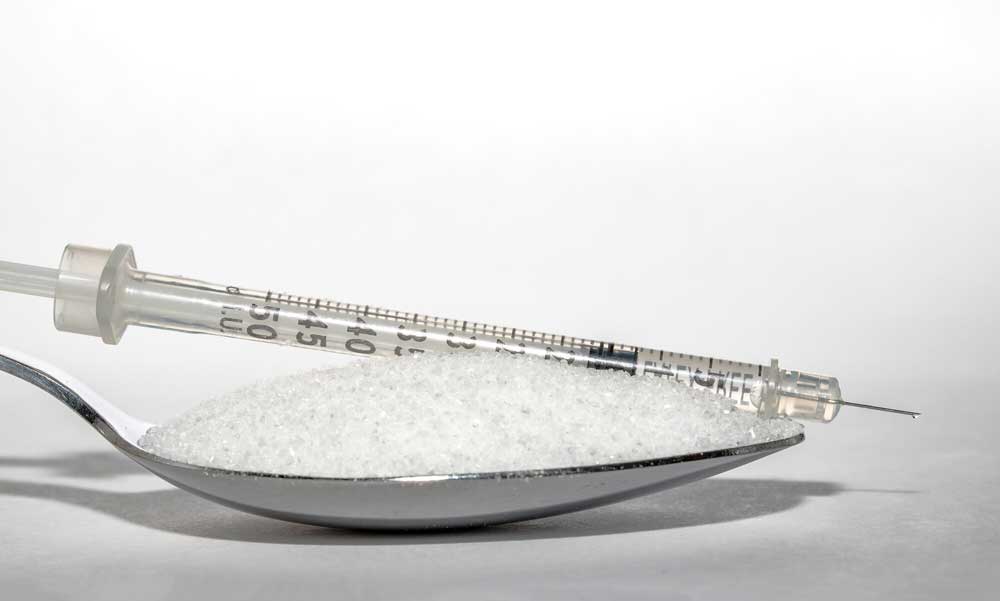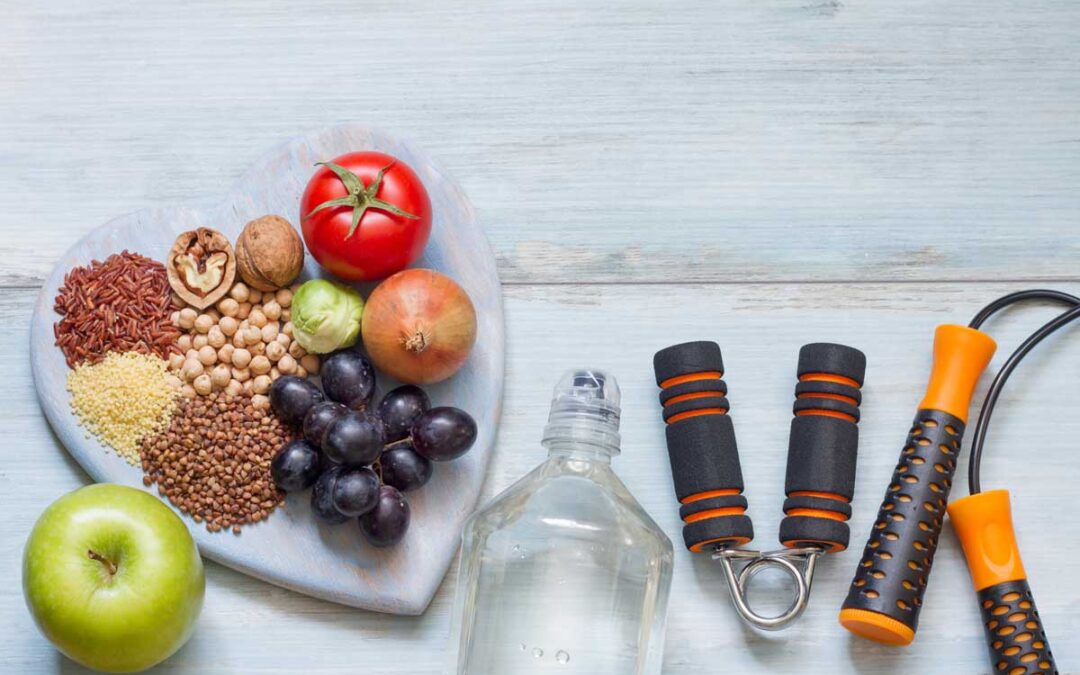
by Ingredia USA | Sep 6, 2021 | Blood Sugar Management
Operating as the powerhouse of our bodies, our blood is an outstandingly vast and intricate system. If laid out, our circulatory system alone would cover over a staggering 66,000 miles!
Blood has many functions, but a key component of whether it is working properly or not comes down to the amounts of sugar found in it. The conditions related to blood sugar are called hyperglycemia and hypoglycemia However, with their similar-sounding names, it could be easy to confuse them.
So what are they, and what are their main differences?
Let us fill you in on all you need to know.
Understanding the Body’s Blood Sugar Management System
To understand both of these conditions, it is beneficial to have a working understanding of the blood sugar management process in our bodies.
We rely on glucose to give our cells and our bodies the energy they need to keep us functioning. The main source of this is via the food we eat, although our body stores latent amounts of glucose in our muscles and liver should we not eat for some time.
The most important food group related to our blood sugar levels are carbohydrates, which, when processed, are turned into glucose. Yet, our cells cannot absorb the all-important glucose without some assistance. This is where insulin comes in.
Much like a key to a locked door, insulin produced in our pancreas allows cells to take in the glucose that our body needs. Once absorbed, the cells then turn the glucose into energy or keep it for later use.
This amazingly efficient system, when working correctly, can regulate how much insulin is needed at any given time. It considers our daily activity, rising and lowering the amount we need depending on if we have eaten or done any strenuous physical activity.
Without eating, the fasting rate of blood sugar is approximately 100 mg/dL.
Given that blood sugar management affects every cell in our bodies, from our head to our toes, the importance of maintaining a normal blood sugar level is indisputable and one that we all should pay attention to.
What Is Hyperglycemia?
Hyperglycemia is when we have a high blood sugar level. This is diagnosed if we have a fasting glucose level of more than 126 mg/dL and a standard glucose sugar level above 200 mg/dL.
This happens either because our bodies cannot produce enough insulin to prevent a buildup of sugar in our bloodstream, or our cells have become insulin resistant.
The reasons for it to happen are also dependant of someone is diabetic or not. High blood sugar levels are synonymous with diabetes on a whole, but the reasons behind them vary dependant on if you have either type 1 or type 2 diabetes.
Type 1 is defined by the body not being able to produce enough insulin. For this reason, those with type one diabetes need to take in insulin, particularly after eating when their blood sugar level spikes.
Type 2 diabetes, on the other hand, is when cells in the body become insulin resistant. Type 2 diabetes is far more common than type 1, accounting for 90-95% of diabetes cases in the US. Although it is so common, it is unclear as to the reasons why people develop the condition, although diet and lack of exercise are seen to be primary factors.
It is possible for someone who is not diabetic, however, to develop insulin resistance or prediabetes, both of which can lead to the development of type 2 diabetes. In addition, certain medical conditions can cause blood sugar levels to rise, as well as having an infection which can lead to increase levels of stress hormones which can affect insulin regulation.
Symptoms of hyperglycemia to look out for include headaches and confusion, extreme thirst, weakness, frequent urination, and a dry mouth, among other things.
What Is Hypoglycemia?
At certain times our blood sugar may drop to dangerously low levels leading to high amounts of insulin in our bloodstream. This is called hypoglycemia. We fall into this category when our blood sugar drops below 70 mg/dL, and it is considered dangerous when dropping below 54 mg/dL.
But why does this happen? Well, it depends on if someone is diabetic or not.
If you don’t have diabetes, then there are many reasons why your blood sugar may drop.
Perhaps the most common reason is down to not eating enough. We are all familiar with that groggy feeling that we may have if we haven’t had a meal for some time. Simply put, the lack of glucose means that our tank is running on empty, and the light-headed feeling we experience is a warning sign for us to take in the fuel that we need.
This being said, for blood sugar levels to get to a significantly low level, we would need to have not eaten for 8 hours or more.
Other common reasons include exercise and overdrinking. When we exercise or exert ourselves to an excessive level, we can use up all our available glucose stores, leading to a drop in blood sugar. In addition, if we binge drink, it can greatly disrupt the liver’s function in processing glucose for our bodies.
If someone has diabetes, then hypoglycemia can happen if they take in too much insulin or, much like anyone else, they haven’t eaten or have increased their amount of physical activity.
Signs of hypoglycemia include confusion and headaches, much like hypoglycemia, but also trouble concentrating, hunger, sweating, and in severe cases, seizures and the loss of consciousness.
The Importance of Regulating Your Blood Sugar
Given its importance, it is clear that a good understanding of our blood sugar should be fundamental to all. We hope this breakdown has been insightful to your understanding of how your wonderful body works.
If you are living with either hyperglycemia or hypoglycemia, a key factor is taking in fuel that can help regulate your blood sugar levels regularly. Pep2dia does just that, as well as being tasty in the process. Find out more about it here.

by Ingredia USA | Aug 23, 2021 | Blood Sugar Management
About 70% of people with prediabetes go on to develop type 2 diabetes. The progression between the two isn’t inevitable, though. In fact, making certain lifestyle changes could prevent diabetes from developing.
Otherwise, type 2 diabetes could lead to kidney failure, heart disease, blindness, and other problems.
Before diabetes develops, your doctor might notice a period where your blood sugar levels are higher than normal. They might diagnose you with prediabetes. With these easy tips, you can learn how to prevent diabetes from progressing.
Read on to discover the 10 tips you need to avoid getting diabetes today.
1. Avoid Refined Carbs and Sugar
Your diet can have a big impact on whether or not you develop diabetes. If you want to stop diabetes in its tracks, consider what you’re eating. For example, sugary foods and refined carbs could increase your risk.
Your body will break these foods into sugar molecules. The bloodstream absorbs these molecules, which can cause a rise in blood sugar levels.
This leads your pancreas to produce insulin. Insulin is a hormone designed to help sugar get out of the bloodstream and into cells.
If you have prediabetes, your cells will resist insulin’s action. Your sugar levels will remain unnecessarily high as a result.
This could cause your pancreas to produce even more insulin as it attempts to reduce your blood sugar levels.
The process can lead to higher blood sugar and insulin levels, leading to type 2 diabetes.
Before that can happen, try reducing your sugar and refined carb intake. It could reduce your risk.
2. Stay Hydrated
Are you prone to drinking sugary sweet beverages? Consider replacing your favorite soda for water instead. Otherwise, beverages with sugar, preservatives, and questionable ingredients could impact your health.
Your risk of type 2 diabetes and latent autoimmune diabetes of adults (LADA) could rise.
Instead, start drinking more water. Water can lead to better blood sugar control. It might improve your insulin response, too.
In one study, people on a weight loss program who replaced diet sodas with water experienced decreased insulin resistance. They lowered their fasting blood sugar and insulin levels as well.
Make sure water is your primary beverage of choice. Otherwise, consider adding coffee and tea to your routine.
Both contain antioxidants called polyphenols, which could protect you against diabetes. Green tea also contains EGCG, which could reduce blood sugar release. It might increase insulin sensitivity, too.
3. Work Up a Sweat
Physical activity could help prevent diabetes as well.
Exercise boosts your body’s insulin sensitivity. You’ll need less insulin to keep your blood sugar levels under control. People with prediabetes who exercised experienced increased insulin sensitivity by 51%.
Those who completed high-intensity exercises increased it by 85%.
Try adding high-intensity interval training, strength training, and aerobic exercise to your routine. Find an exercise you love and stick to it!
4. Quit Smoking
Smoking can increase your risk of:
- Heart disease
- Lung, breast, prostate, and digestive tract cancer
- Emphysema
Smoking and second-hand smoke could increase your risk of diabetes, too.
If you want to prevent diabetes from developing, try quitting.
5. Shed Some Pounds
The majority of people with type 2 diabetes are overweight or obese. Meanwhile, people with prediabetes tend to carry weight around their midsection. They also have visceral fat around abdominal organs like the liver.
Excess visceral fat can promote inflammation and insulin resistance. Your risk of diabetes could increase as a result.
Losing even the smallest amount of weight might reduce your risk.
Try adjusting your diet and exercising. For example, you can try a low-carb, Mediterranean, paleo, or vegetarian diet. Try to stick with the change long-term to help you maintain your weight loss.
6. Go Low-Carb and High-Fiber
As you start making lifestyle changes for diabetes prevention, consider your diet. A ketogenic or low-carb diet might prevent diabetes.
A low-carb diet could help:
- Increase insulin sensitivity
- Lower blood sugar levels
- Reduce other diabetes risk factors
Minimizing your carb intake will keep your blood sugar levels from rising too much after you eat. Your body will then need less insulin to maintain your blood sugar levels.
A low-carb or ketogenic diet might reduce your fasting blood sugar, too.
Try adding more fiber to your diet, which could benefit your weight management and gut health. Fiber could keep your insulin and blood sugar levels low as well.
Don’t forget dairy! Consuming low-fat dairy products helped study participants reduce their risk of diabetes. Consider adding plain yogurt to your routine.
Otherwise, minimize your intake of processed foods. Processed foods can increase your risk of diabetes, obesity, and heart disease. Avoid refined grains and additives, too.
7. Avoid a Sedentary Lifestyle
If you want to learn how to prevent diabetes, get on your feet. A sedentary lifestyle could increase your risk. Instead, try to get more physical activity into your routine.
For example, you might consider standing up from your desk throughout the day if you work at an office. Try to walk around for a few minutes each hour.
Otherwise, go for a walk during lunch.
Here are a few more tips that can help you combat stress and weight gain.
8. Adjust Your Portion Sizes
In addition to considering what you eat, you might want to look at how much you’re eating. It’s not enough to follow a ketogenic or low-carb diet. If you’re eating too much, you could still lead to diabetes.
Eating too much in one sitting can cause higher blood sugar levels. Your insulin levels might rise as well.
Instead, take the time to adjust your portion sizes.
Take the time to look at the labels of the food you eat to determine the right serving size. Consider using smaller plates, too. A few minor changes can help you better manage your portion control.
9. Choose Vitamin D
Vitamin D could impact your blood sugar control. If you’re not getting enough vitamin D, it might increase your risk of diabetes.
Instead, consider taking vitamin D supplements. Make sure to talk to your doctor, first. Some vitamins can interact with any medications you’re taking.
10. Try Herbs
Adding a few natural herbs to your routine might help with diabetes prevention as well. Talk to your doctor about curcumin and berberine. They’ll help you determine if these herbs are safe for you to take.
Stop Prediabetes Progression: 10 Tips to Help Prevent Diabetes
Your prediabetes doesn’t have to progress any further. Instead, use these 10 tips to prevent diabetes. With these diabetes prevention tips, you can take control of your health and future.
Looking for more ways to promote better health? Consider ethically sourced, high-quality dairy ingredients.
Contact us today to discover how we can help.

by Ingredia USA | Aug 9, 2021 | Blood Sugar Management
About 13% of adults in the US live with diabetes. Another 34.5% have prediabetes.
If your body doesn’t make or use insulin properly, you could develop high blood pressure. High blood pressure is often associated with diabetes. If your blood sugar levels continue to rise, it could cause serious problems.
For example, too much glucose can damage your kidneys, nerves, and eyes. It could cause heart disease, stroke, and other complications, too.
Don’t let it get that far. Instead, consider these 13 easy ways to naturally lower your blood sugar.
With these tips, you can keep your blood sugar levels in check without stress. Your overall health could improve as a result.
Discover how to lower your blood sugar with these tips today.
1. Work Up a Sweat
Grab your favorite pair of running shoes and head outside! Regular exercise could help you lower your blood sugar. It can also help you maintain a moderate weight.
Meanwhile, your insulin sensitivity could increase, too. Increased sensitivity means your cells are able to use the sugar that’s available in your bloodstream.
Once you start exercising, your muscles can use blood sugar for energy.
It benefits muscle contraction, too.
Try different forms of exercising, including walking, running, and biking. Consider swimming and weightlifting as well.
Your muscles will use glucose more effectively, which could reduce blood sugar levels.
2. Reconsider Carbs
As you learn how to naturally lower your blood sugar, it’s important to consider your diet. Your diet can have a major impact on your blood sugar levels.
After all, your body breaks carbs down into sugars. Insulin then helps the body use and store that sugar for energy.
If you eat too many carbs, however, the process won’t work properly. Your blood glucose levels will rise instead.
Try to manage your carb intake. You might need to begin counting carbs. Try planning your meals before you eat to make sure you’re on track.
A low-carb diet can help reduce your blood sugar levels. It could help prevent blood sugar spikes, too.
3. Stay Hydrated
Grab a bottle of water and fill it up! Drinking enough water each day could keep your blood sugar levels at a healthy limit. Otherwise, you could experience dehydration.
Drinking water will help your body flush out excess sugar through your urine.
In one study, participants who drank more water had a lower risk for developing high blood sugar levels, too.
Try to avoid beverages that are sweetened with sugar. Otherwise, those beverages could increase your diabetes risk. They might raise your blood glucose and lead to weight gain as well.
4. Get More Fiber
Remember, your diet can have a major impact on your blood sugar levels. Take a moment to consider your fiber intake, too. Fiber can slow carb digestion and sugar absorption.
In other words, fiber triggers a gradual rise in blood sugar levels.
There are two types of fiber, soluble and insoluble. Soluble fiber could help improve your blood sugar management.
A higher fiber diet might help patients manage their type 1 diabetes. It could help improve the body’s ability to regulate blood sugar. It might help reduce blood sugar lows, too.
5. Look for a Low Glycemic Index
The glycemic index measures how we digest foods. It can impact the rate your blood sugar levels rise, too. Try eating low-glycemic-index foods to naturally lower your blood sugar instead.
For example, you can try:
- Oats
- Beans
- Yogurt
- Barley
- Bulgur
- Wheat pasta
- Non-starchy vegetables
- Legumes
- Lentils
Don’t forget to monitor your carb intake.
6. Consume Chromium and Magnesium
A micronutrient deficiency could impact your blood sugar levels. Try eating foods that are high in chromium and magnesium.
For example, you can try:
- Fruit
- Vegetables
- Nuts
- Whole grains
- Meats
- Dark leafy greens
- Tuna
- Avocados
- Beans
- Bananas
- Dark chocolate
These foods could reduce your risk of blood sugar problems. Otherwise, consider taking supplements.
7. Minimize Stress
Stress could cause your blood sugar levels to spike. Your cortisol and glucagon levels will rise, which can impact your blood sugar levels.
Try meditating, exercising, or using yoga to relax. You could lower your blood sugar levels as your stress levels drop.
Here are a few ways to combat stress.
8. Get Some Sleep
Make sure you’re getting enough sleep each night. Otherwise, your insulin sensitivity and blood sugar levels could fluctuate. You might experience weight gain or increased appetite as a result.
Inadequate sleep can disrupt metabolic hormones, too.
Instead, improve your sleep quantity and quality to improve your health.
9. Keep Track
How do you know if your blood sugar is low? Make sure you’re monitoring it! Monitoring your blood glucose levels could help you manage them.
You can determine if you need to adjust your medications or meals. You can see how your body reacts to certain foods, too.
10. Use Portion Control
It’s not enough to adjust what you eat. If you want to lower your blood sugar, consider how much you eat, too. Portion control might help you maintain a moderate weight.
Managing your weight could promote healthy blood sugar levels. It could reduce your risk of type 2 diabetes, too.
As you learn how to manage your portion sizes, try:
- Using smaller plates
- Reading food labels for serving sizes
- Keeping a food journal
- Eating slowly
- Measuring and weighing your portions
Otherwise, try to avoid “all you can eat” restaurants.
11. Sip Apple Cider Vinegar
Apple cider vinegar could promote lower fasting blood sugar levels. It might improve your insulin sensitivity, too.
Try mixing a little apple cider vinegar with water or using it as a salad dressing.
12. Try Cinnamon Extract
Cinnamon could improve your insulin sensitivity and lower blood sugar levels by up to 29%. It could slow the breakdown of carbs in your digestive tract, too. This process might moderate the rise of blood sugar after a meal.
13. Manage Your Weight
Above all else, make sure to maintain a moderate weight. Maintaining a healthy weight could benefit your overall health. It might prevent future health problems from developing, too.
Weight management can also help promote healthy blood sugar levels.
In fact, a 7% reduction in body weight could decrease your risk of developing diabetes by 58%.
Watch It Drop: 13 Ways to Naturally Lower Your Blood Sugar
Your blood sugar levels don’t have to control your future. Instead, use these 13 tips to naturally lower your blood sugar. With these tips, you can stay happy and healthy without worry.
Make sure to speak with your doctor before making any major changes. They can help you develop a treatment plan with your needs in mind.
Searching for other ways to regulate your blood sugar? Learn more here.

by Ingredia USA | Mar 5, 2021 | Blood Sugar Management
What if diabetes didn’t have to change your quality of life?
Whether you were diagnosed with diabetes years ago or only recently, it’s easy to imagine that diabetes will control your entire life. But you can change all of this with the right diabetes self management.
Want to manage your own diabetes better? Keep reading to discover our complete guide!
Diabetes Self Management Begins With Self Care
Our guide is here to make diabetes self management so much easier for you. And proper self management begins with proper self care.
Part of this care is staying active and sticking to a healthy diet, which we’ll dive more into later in the guide. And another part is getting your prescriptions filled at the proper times and taking all of your medicine as directed by your doctor. That may sound basic, but many issues diabetics face begin with deviating from their recommended medicine schedule.
It’s important to attend regular health visits and wear medicinal identification gear when you travel. Furthermore, you need to monitor your blood glucose level regularly and understand what the numbers mean in terms of your health.
Finally, you should know that a diabetes diagnosis may change the way you view yourself and your life. Reach out to your friends, family, and mental healthcare professionals in order to make sure that your diabetes does not lead to depression or other major issues.
Asking the Right Questions
Be honest – what does an average session with your physician look like? If they reflect on this question, most patients simply sit back and nod their heads at whatever the doctor is saying.
But when you are managing your diabetes, it is important to ask questions of your different physicians. Furthermore, you need to know the right questions to ask.
One good question is where you can learn more about diabetes. The internet is filled with information, and not all of it is accurate. But your doctor can guide you to the right resources to help you learn more.
It’s also good to ask how your different friends and family can help you manage your diabetes and help you maintain a more active lifestyle. They are likely willing to help, but many patients and their extended support network don’t know how to get started.
Finally, it’s very important to ask about the “fine print” in terms of what your insurance covers, how much everything will cost, and what your options are if you cannot pay for everything all at once. The last thing you want to worry about while managing diabetes is dealing with a surprise bill!
Carrying the Right Gear
When you get right down to it, most aspects of diabetes management are pretty straightforward. But one of the best things you can do is have the right gear on you, especially when you are out of the house.
This gear includes your glucose meter, strips, and treatment for low blood sugar. And you should have a bracelet or other form of identification that tells others that you are a diabetic.
When traveling, there are extra precautions you must take. You should have a list of your medicine, with notes on when to take each item. And you should keep insulin and medication with you so there is no risk of these things getting lost.
Don’t forget to pack extra medicine and food with you in the event of delays and other schedule changes. And make sure you have a list of your doctors and their phone numbers in the event of an emergency.
What To Do When Sick
So far, our guide focuses on getting you through a typical day. But what about days when you are sick?
We recommend checking to see if you have a fever right away. And try to keep clear liquids with sugar on hand (everything from soda to popsicles can work).
You should have separate medicine set aside to help you deal with issues like fever and nausea. And as an added safety precaution, check your blood sugar more often throughout the day.
Staying Active
One of the very best things you can do for your diabetes management is to maintain an active lifestyle. But what does that mean for your daily life?
First of all, we recommend consulting with your physician before attempting the strenuous activity. And your physician can also let you know if your intended exercise regimen is too intense or not intense enough.
If possible, you should try to get 30 minutes of exercise at least five days a week. Additionally, you should engage in strength exercises at least twice a week.
Sticking to this exercise regimen will make you healthier and happier, and all while making your diabetes easier to manage.
Stress and Diabetes
Stress plays a major role in diabetes. If you already have diabetes, your health may suffer due to the stress you experience. And if you don’t already have diabetes, there is a chance that stress could cause it!
Recent research has revealed a potential link between stress and Type 2 diabetes. This is because stress hormones may actually prevent insulin-producing cells in your pancreas from working right and limit how much insulin your body produces.
That can lead to type 2 diabetes. And if you are a “stress eater,” then packing on extra pounds due to stress you are experiencing may also cause type 2 diabetes.
Stress is also a factor if you already have diabetes. You might get hypo anxiety or simply feel overwhelmed due to having to manage so many things as a part of your condition. And a recent study discovered that stress hormones may lead to higher blood sugar levels.
Different Types of Stress and Your Diabetes
There are multiple types of stress that you may be experiencing. And these different types of stress have different effects on your diabetes.
If you have type 2 diabetes, mental stress may increase blood glucose levels. And if you have type 1 diabetes, mental stress could potentially lower or increase your blood glucose.
You may also experience physical stress. This may increase your blood sugar no matter what kind of diabetes you have. And your body may have the same reaction when you are sick or injured.
Dealing With Stress
Obviously, stress can be a scary factor when it comes to diabetes. Fortunately, there are multiple ways you can deal with this stress.
Make sure you get enough sleep each night. And try to establish a regular exercise routine, as this can fight stress and also keep your body healthy.
It’s important to schedule some relaxation time for yourself each day so you don’t stress yourself by working too hard. And finally, don’t be afraid to reach out to your support network whenever you are feeling frightened or overwhelmed, and don’t be ashamed if you need to turn to therapy.
Different Solutions for Different Types of Stress
The above suggestions can help with general feelings of stress. But once you isolate what kind of stress you are experiencing, you can try out some very specific solutions.
For example, taking up yoga or other regular exercise is a great way to deal with physical stress. If you are experiencing emotional stress, try to isolate yourself for at least five minutes and breathe deeply. During this time, placing your hand on your belly while you breathe may help you calm down.
Stress from family or work basically has the same solution: setting proper limits. Don’t be afraid to say “no” to stressful family events. And at work, talk to your supervisor if you are feeling overwhelmed before things get worse.
What Next?
Now you know how to handle your own diabetes self management. But do you know who can make that process much easier?At Ingredia, we specialize in innovative ingredients that can help create healthy dairy products. To learn more about what our research can do for you, contact us today!

by Ingredia USA | Jan 15, 2021 | Blood Sugar Management, Stress Management & Sleep Disorders
The American Psychological Association conducted a Stress in America survey in 2017 that had some illuminating results.
For one, it reveals that three out of four Americans reported feeling at least one stress symptom in the last month. That stress comes from several places—the state of politics, the economy, money, healthcare, taxes, unemployment, crime, and much more.
Stress manifests itself in several ways: physically, mentally, and emotionally. It leaves many sleepless, anxious, depressed, or irritable. Another way stress is evident is through unexpected weight gain.
If this feels like you, you’re not alone. Know there are ways to combat stress, weight gain, and other unwanted symptoms of feeling strain or tension in your life. You deserve relief—so we’ve created this brief but actionable guide to feeling better.
Is There a Link Between Stress and Weight Gain?
It likely comes as no surprise that stress contributes to weight gain.
When somebody is stressed out, it’s not long before healthy eating goes on the back burner. Instead, someone might turn towards the quickest, easiest option—which isn’t always the best one.
Stress can cause individuals to:
- Forget to drink water
- Skip their meals or overeat
- Consume unhealthy food, such as whatever’s fast or most accessible
- Emotionally eat
- Exercise less
- Sleep less
What’s the reason behind this behavioral change?
When cortisol levels rise, weight gain follows. That’s because stressed-out bodies release cortisol and adrenaline, which causes glucose—a source of energy in the body—to get released into the bloodstream. What your body is doing with glucose is equipping you to fight, escape, or survive a risky situation.
This is known as your fight-or-flight response.
Another cause for weight gain is the natural urge for sugar. Because glucose is an energy source, the body craves that quick energy known as sugar. But with no ‘fight’ to be had, the body stores that sugar in the body—which takes the form of abdominal fat.
Cortisol also slows down metabolism, making it hard to lose weight, too.
Luckily, there are some tried-and-true ways to combat both stress and, therefore, weight gain. While stress may make you feel powerless, you have more control over it than you may realize. With the implementation of specific good habits (such as healthy eating), you may be able to feel more serene—and lose weight in the process.
Ways to Combat Stress
The first order of business is addressing stress. Combatting symptoms at their origin—in this case, stress—provides the opportunity to heal, grow, and maybe even fight effects such as depression, anxiety, anger, and even weight gain.
Battling stress might feel challenging, but it doesn’t have to be. Start small, build habits, and slowly add in a way that supports your mental, physical, and emotional health. Avoid setting lofty goals—rather, focus on attainable tasks first and build from there.
Some fantastic ways to reduce stress include:
- Choosing healthier food options when eating for comfort—avoiding an excessive intake of carbs, fats, and processed sugar
- Limiting or eliminating bad habits such as alcohol use, smoking cigarettes, exorbitant screentime, etc.
- Making physical activity (of any kind) a priority in your day/week
- Also, making fun activities a priority, such as taking walks, listening to music (preferably at loud volumes), cuddling your dogs, painting a blank canvas, taking a nap—you name it!
- Finding and keeping a consistent sleep schedule
- Limiting your caffeine intake, especially in the late afternoon and early evening
- Calling your mom, best friend, sibling, or someone else for comforting conversation
- Focusing on your breathing or trying breathing exercises
These are all actionable tips. Some may apply to your life while others don’t, but the gist is the same either way.
Ask yourself what habits might be hindering your progress or bringing you down, and learn what’s causing your stress. Then, find positive, engaging, inspiring, and sustainable ways to make yourself happy.
Ways to Combat Weight Gain
There are two main components to taking the weight off and then keeping the weight off:
- Patience
- Consistency
One of the links between stress and weight gain is that the stressed individual tends to try fad diets. Unfortunately, while these trending diets tend to work in the short-term, they hardly ever have longevity. They often consist of eliminating essential food groups in the diet, ‘detoxing’ through juices or cleanses, and may even cause harm.
The key is patience. Attain a slow and steady loss that’s also sustainable. Consistency is also important. Develop an eating style that supports you and can last a lifetime. If you’re losing quick pounds, the odds aren’t high you’ll keep them off. And if you try eliminating diets, you’ll have a hard time maintaining them for years to come.
Rather, focus on a healthy, well-balanced, and nutritious diet daily. If you find yourself eating out often, consider meal-prepping for a few hours one day, which gives you a week’s worth of ready-to-eat or -heat food. Also, allow yourself “cheat days” or treats every once in a while, because fully abstaining fosters the craving, leading to binging.
Deal With Stress in a Way That Supports Your Well-Being
If you’ve read this far, you’re already taking great strides to combat stress in your life. One of the smallest first steps, researching causation and learning ways to heal, proves to be one of the most significant.
You’ve already put in work. Now you just have to keep doing it. Why?
Because losing weight is only one advantage to beating stress. Other benefits include more focus, a more positive outlook on life, better sleep, and so much more! If you’re ready to get your life back, we guarantee it’s ready for you to take it back.
At Ingredia, we believe in a happy, healthy life. That’s why our mission is to improve the well-being of anyone in our reach. With dairy-based bioactive ingredients, we hope to offer positive effects that are impactful and life-changing. Click here to read more about our illness-fighting, stress-relieving, natural products.





